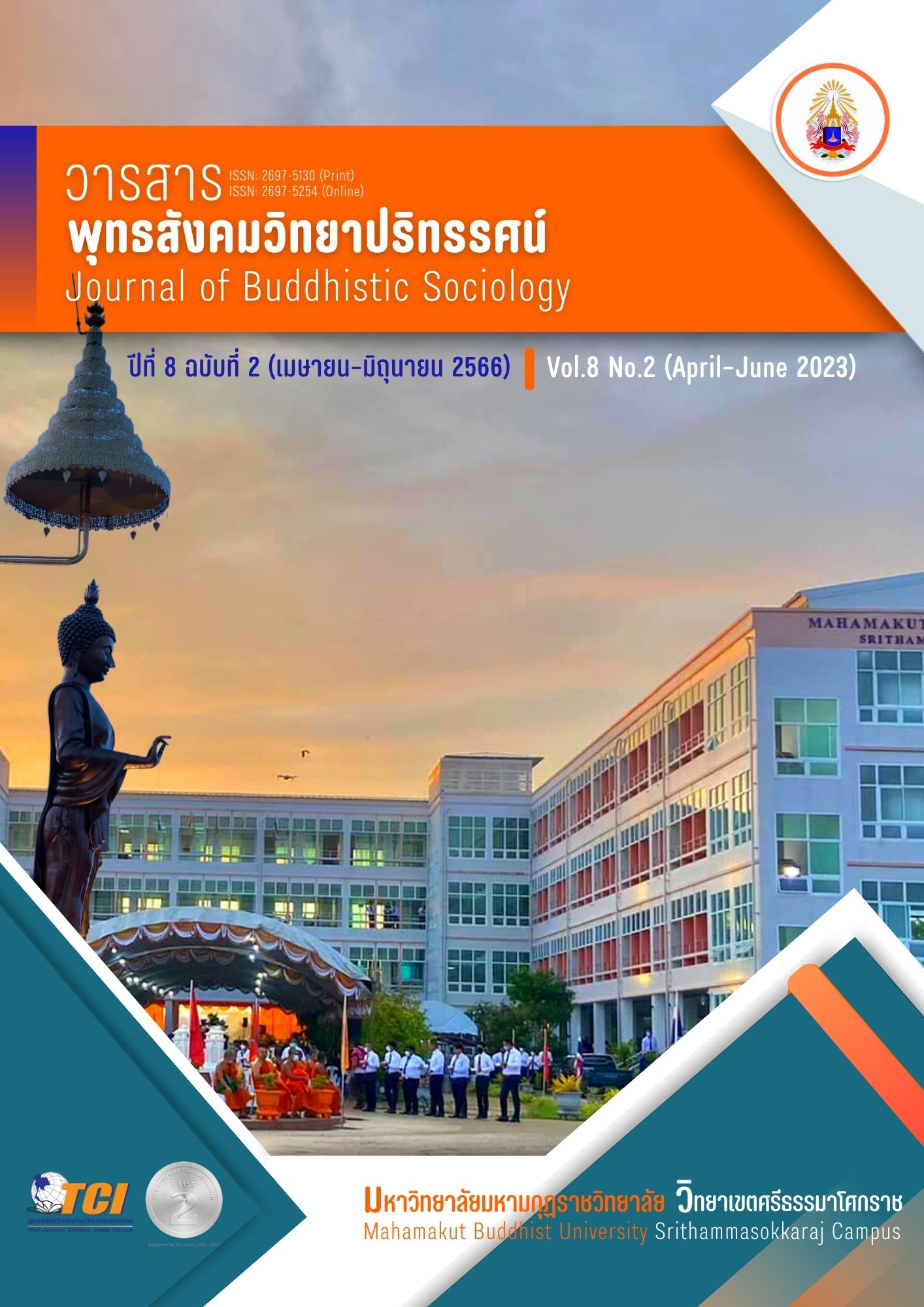THE PERFORMANCE ACCORDING TO BALA PRINCIPLE OF PRISONERS IN SONGKHLA CENTRAL JAIL
Main Article Content
Abstract
The article “Living under Bala Principles 5 of Prisoners in Songkhla Central Prison” aims to 1) study the prisoners’ way of life under the Bala Principles 5 in Songkhla Central Prison and 2) study the recommendations for prisoners’ way of life under the Bala principles 5 in Songkhla Central Prison. The research employed mixed methodology research, and the sample for the quantitative research included 359 prisoners of the Songkhla Central Prison. Statistics used for data analysis were frequency, percentage, mean, and standard deviation. For the qualitative research, the questionnaire and interview form were used to collect in-depth and structured data from three staff members. Then the data were analyzed using content analysis to find the conclusions.
The results showed that;
1. Overall, prisoners’ way of life under the Bala Principles 5 in Songkhla Central Prison was high in all aspects. When considering each aspect by descending mean values, Concentration and Intention had the highest average, followed by Persistence and Endeavor, next was Faith and Belief, then Consciousness and Recall, and finally, Intelligence and Knowledge had the lowest level.
2. Recommendations for prisoners’ way of life under the Bala Principles 5 in Songkhla Central Prison were divided into problems and ways to promote how to solve the problems. Most suggestions were for the aspect of Intelligence and Knowledge. There should be activities to give more knowledge about morals and ethics or campaigns to encourage the prisoners to apply more Buddhist principles to their lives. The correct understanding can lead to applying Bala Principles 5 for the ways of life.
From the results gained by interviews, all informants agreed that Bala Principles 5 could be used as the practical principles for the prisoners while living in the Songkhla Central Prison. These principles were directly beneficial to the prisoners. There should be the support and promotion of the Bala Principles 5, including the training programs organized to give knowledge in various areas, such as character development and vocational training, for the benefit of the prisoners. Social friends, officers, and Prisons can live together in a normal and peaceful society under the law and control of the country. It also affects the implementation after the prisoners return to normal society.
Article Details

This work is licensed under a Creative Commons Attribution-NonCommercial-NoDerivatives 4.0 International License.
References
กนิษฐา แสนสมบัติ. (2552). การพัฒนาแนวทางการจัดกิจกรรมส่งเสริมจริยธรรมผู้ต้องขังเรือนจำจังหวัดเลย. ใน วิทยานิพนธ์ศิลปศาสตรมหาบัณฑิต. มหาวิทยาลัยราชภัฏเลย.
นภษร รัตนนันทชัย และคณะ. (2563). กระบวนการการพัฒนาสันติภาวะของผู้ต้องขังกระทำผิดซ้ำ: กรณีศึกษาเรือนจำพิเศษกรุงเทพมหานคร. วารสารสันติศึกษาปริทรรศน์ มจร, 8(3), 889.
พระกิตติ กิตฺติสาโร (จ่ามเงิน). (2560). การบรรเทาอกุศลมูลด้วยพละ 5. ใน วิทยานิพนธ์ศาสนศาสตรดุษฎีบัณฑิต สาขาวิชาพุทธศาสน์ศึกษา. มหาวิทยาลัยมหามกุฏราชวิทยาลัย.
พระพรหมคุณาภรณ์ (ป. อ. ปยุตฺโต). (2555). พุทธธรรม ฉบับปรับขยาย (พิมพ์ครั้งที่ 32). กรุงเทพมหานคร: ผลิธัมม์.
พระมหาชยาวุธ จิรวฑฺฒโน (สมัพันธสิทธิ์). (2562). ศึกษาวิเคราะห์การบริหารงานตามหลักพละ5ขององค์การบริหารส่วนตำบล ในเขตอำเภอเมือง จังหวัดเลย. ใน วิทยานิพนธ์รัฐศาสตรมหาบัณฑิต สาขาวิชาการปกครอง. มหาวิทยาลัยมหามกุฎราชวิทยาลัย.
พระวีระศักดิ์ วีรปญฺโญ (อินทรวิเศษ). (2561). ศึกษาวิเคราะห์การดำเนินชีวิตด้วยเบญจธรรมตามหลักพุทธปรัชญาเถรวาท. ใน วิทยานิพนธ์ศาสนศาสตรมหาบัณฑิต สาขาวิชาพุทธศาสนาและปรัชญา. มหาวิทยาลัยมหามกุฏราชวิทยาลัย.
พระสมุห์บุญฤทธิ์ มหาปุญโญ (ศรีวิชัย). (2563). หลักธรรมพละ 5 (ศรัทธาพละ) กับการเกื้อหนุนการปฏิบัติพระกรรมฐาน. Journal of Roi KaensarnAcademi, 5(2), 169.
แม่ชีวรนุช พงศ์ชนะชัย. (2560). ศึกษาพละ 5 ในการปฏิบัติวิปัสสนาภาวนาตามแนวสติปัฏฐาน 4. ใน สารนิพนธ์ปริญญาพุทธศาสตรมหาบัณฑิต สาขาวิชาวิปัสสนาภาวนา. มหาวิทยาลัยมหาจุฬาลงกรณราชวิทยาลัย.
รัชนีภรณ์ แก้วไพรวัลย์. (2550). ปัจจัยที่มีผลต่อการกระทำผิดวินัยของผู้ต้องขังหญิงกรณีศึกษา: เรือนจำจังหวัดสมุทรสาคร. ใน ศิลปศาสตรมหาบัณฑิต สาขาการบริหารงานยุติธรรม. มหาวิทยาลัยธรรมศาสตร์.
ศุภวรรณ ธนุภาพรังสรรค์ และมาลีวัล เลิศสาครศิริ. (2559). ผลของการใช้รูปแบบการฝึกสมาธิโดยบูรณาการฯ. วารสาร ว. พยาบาลสงขลานครินทร์, 36(ฉบับพิเศษ), 23.
สุดารัตน์ กาญจกานนท์. (2561). บทความวิจัยการจัดการการใช้ชีวิตของผู้ต้องขังหญิงในทัณฑสถานหญิงสงขลา. ใน ปริญญารัฐศาสตรมหาบัณฑิต สาขาวิชาสหวิทยาการเพื่อการพัฒนาท้องถิ่น. มหาวิทยาลัยรามคำแหง.


